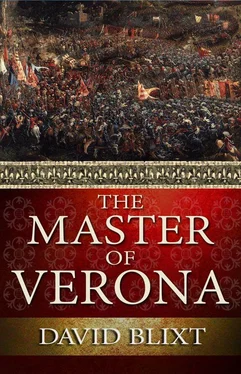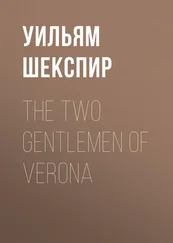David Blixt - The Master of Verona
Здесь есть возможность читать онлайн «David Blixt - The Master of Verona» весь текст электронной книги совершенно бесплатно (целиком полную версию без сокращений). В некоторых случаях можно слушать аудио, скачать через торрент в формате fb2 и присутствует краткое содержание. Год выпуска: 2012, Издательство: Sordelet Ink, Жанр: Исторические приключения, на английском языке. Описание произведения, (предисловие) а так же отзывы посетителей доступны на портале библиотеки ЛибКат.
- Название:The Master of Verona
- Автор:
- Издательство:Sordelet Ink
- Жанр:
- Год:2012
- ISBN:нет данных
- Рейтинг книги:5 / 5. Голосов: 1
-
Избранное:Добавить в избранное
- Отзывы:
-
Ваша оценка:
- 100
- 1
- 2
- 3
- 4
- 5
The Master of Verona: краткое содержание, описание и аннотация
Предлагаем к чтению аннотацию, описание, краткое содержание или предисловие (зависит от того, что написал сам автор книги «The Master of Verona»). Если вы не нашли необходимую информацию о книге — напишите в комментариях, мы постараемся отыскать её.
The Master of Verona — читать онлайн бесплатно полную книгу (весь текст) целиком
Ниже представлен текст книги, разбитый по страницам. Система сохранения места последней прочитанной страницы, позволяет с удобством читать онлайн бесплатно книгу «The Master of Verona», без необходимости каждый раз заново искать на чём Вы остановились. Поставьте закладку, и сможете в любой момент перейти на страницу, на которой закончили чтение.
Интервал:
Закладка:
I seemed to fly!
"He's from Capua," whispered Mariotto. "His father is thinking about relocating the family business here."
"His family's in business? I thought — "
"Yes, I know. They are noble. But it's a nobility that cost them."
"Ah." Mariotto didn't have to say more. The greatest blight on the nobility was the sale of noble titles by kings, popes, and emperors. When a noble died without heir, the local ruler was able to take the defunct title with the land attached and sell it for a profit to any wealthy, ambitious member of the merchant class. Often living as nobles before nobility was granted them, these gente nuova dressed in noble fashion, kept house, ate, read, traveled exactly as the nobility did. A disgrace to be sure, but a growing practice nonetheless.
There was another side, of course. Though the nobility was loath to admit it, the influx of new blood into their ranks often helped maintain their thinning numbers. Many who were noble today came from ignoble origins — such as the della Scalas. No one was ever crass enough to point that out, though.
"I'm to show him around the city," said Mariotto.
"You ought to charge a fee." The attempt at levity fell on young Montecchio's ears with all the aplomb of a wounded duck. "What if I joined you?"
Mariotto looked up. "Would you? Would your father let you?"
"It might take some doing, but I think I can arrange it." Pietro grimaced. "We might have to bring my little brother with us."
Mariotto brightened. "My thanks, nevertheless…,"
The noise rose to a deafening pitch, drowning out Montecchio's words. The Master of Revels was bringing his song to a crashing end.
And this is the lord
With great valour,
Whose grand honour
Is spread on earth and sea!
Cangrande didn't wait for the accompanying music to stop. He jumped to his feet and embraced the diminutive genius, kissing him on both cheeks. Then he turned to Dante, still unmoved by the revels around him. Eyes twinkling, the Capitano said, "I am astonished that this man who plays the fool has gained the favor of all, while you who are called wise can't do the same."
Dante Alaghieri looked up at the lord of Verona, face devoid of expression. "You should not be astonished that fools find joy in other fools."
At which Cangrande fell in beside the poet and laughed until he cried.
The lone rider had tears streaming from his eyes when he was stopped at Verona's Ponte Pietro, the bridge leading east. "Where's the fire, lad?" asked the captain of the guard.
"I know him," said the seargent-at-arms. "Muzio. He's a page to Lord Nogarola's brother."
Realizing this might be something serious, the captain's tone grew more brusque. "What's happened?"
The boy couldn't speak. He reached for a wineskin at his hip, but a soldier got to him first with a flask of spirits. The boy coughed, then croaked out his news. "Vicenza. It's burning!"
Four
The good humour on the loggia gave way to hunger as smells wafted in from the dining-hall. The mingled scents of wine, spiced meat, melting cheese, and warm bread soaked in olive oil had all men salivating.
Pietro was singing a ribald chorus with the groom's friends and hoping his father wasn't listening when he noticed a woman in the great doorway. She was older than he might have expected, but lovely, done up in the new fashion, with her dark hair in wavy curls framing her oval face. Dressed in hanging panels of brocaded gold and burgundy, she glided into the room. Giovanna of Antioch, great-granddaughter of Emperor Frederick, sister of Cecchino's mother, and wife to the Capitano of Verona.
Removing himself from the cluster of men, Cangrande strode over to her, the wiry greyhound dogging his heels. She went up on her toes and spoke in his ear.
At the corners of the doorway beyond her, two children appeared. Pietro nudged Mariotto and whispered, "I thought Cangrande didn't have an heir."
"Not by his wife, anyway," replied Mariotto dourly. Realizing he'd spoken aloud, he coloured. "I apologize. Those are his brother's sons, Alberto and Mastino."
From Mariotto's indicating nods, Pietro learned that Alberto was the larger of the pair. A pleasant-looking child, about eight or nine years old, he seemed embarrassed to be where he knew he shouldn't. The youngest man in the room was probably Pietro's brother at fourteen years, almost a man, also a guest. Alberto knew the world of adults was still outside his sphere.
Just behind him, prodding him onward, young Mastino looked to be about six. Undoubtedly Scalageri, his face bore all the easy magnificence that graced his uncle. Yet in watching him, Pietro saw a little devil at work. Mastino pressed his brother on into the room. When Alberto wasn't scolded, little Mastino strode boldly past his pliable older brother. He stood on his heels, hands on hips, looking around the room as if he owned it. He was a genuinely gorgeous child.
Cangrande bowed to his wife, stepping back as she addressed his guests. "Gentlemen, lords, and honoured guests! The wedding feast is prepared!" A cheer. "I regret to say, though, that my husband has shamed me. Shamed me, his loving wife, by offering his nephew a feast that far outstrips the one for our own nuptials all those years ago. He has done me shame by offering to you what he never gave to me. So you must all assist him by making sure there is no evidence left!" Laughter, more appreciative cheers.
Cangrande draped an arm around his wife's shoulders. "Someone, assist the groom to his seat at the head of the table. He seems to have found the liquid courage he needs to face his wedding night — if only he can remember what to do!" With an accompanying roar the group broke apart and prepared to move into the feasting hall below.
A hand slapped Pietro's shoulder. "Nice job of wriggling."
Pietro didn't bother to turn. "You're just jealous, Poco. You couldn't have done it." As a boy, Pietro had had such trouble with his brother Jacopo's name that he'd reversed the sounds, turning it into Poco. As Jacopo grew older, the nickname became an appropriate joke — he was short for his age. He'd also inherited their father's protruding lower lip, which set his young face in a perpetual pout.
"Who needs Aristotle?" asked Poco.
"Anyone with sense," came the voice that made them both stiffen. Dante's fingers clipped his younger son a light flick on the ear. "Pietro, who is your new friend?" Pietro told him. The poet looked surprised and uttered a mysterious, "Interesting."
"Why interesting?" asked Pietro.
But Dante was already heading towards the door. "Come along, Jacopo. Pietro, I'll see you downstairs."
Cowed, Poco trailed closely behind as Dante made for the exit. The bridegroom was being physically carried out the same doors by three friends while a fourth friend plied him with bread and water. Little Mastino and Alberto followed, poking the groom in the ribs to see if they could make him vomit.
Mariotto and Pietro hung back from the crowd of guests wandering out to their various suites to change for the meal. It would be at the least another half hour before they were all seated and able to eat, and Pietro recognized it as the perfect time for Mariotto to approach the young Capuan he was obliged to befriend.
The fellow was staring out the arched palisade at a rider galloping into the courtyard below. The Capuan's doublet and hose were very fine, but showed a reckless neglect around the elbows and knees. His muscles looked as slack as a sackful of horsefeed, which is to say not at all. Hearing footsteps on the marble behind him he turned, face haughty. "I'll be there in a minute." He must have thought they were servants.
"Ah, good day," said Pietro. "I'm, ah, my name is Pietro…"
Читать дальшеИнтервал:
Закладка:
Похожие книги на «The Master of Verona»
Представляем Вашему вниманию похожие книги на «The Master of Verona» списком для выбора. Мы отобрали схожую по названию и смыслу литературу в надежде предоставить читателям больше вариантов отыскать новые, интересные, ещё непрочитанные произведения.
Обсуждение, отзывы о книге «The Master of Verona» и просто собственные мнения читателей. Оставьте ваши комментарии, напишите, что Вы думаете о произведении, его смысле или главных героях. Укажите что конкретно понравилось, а что нет, и почему Вы так считаете.












